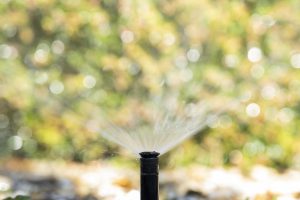The average American family uses 320 gallons of water daily, about 30 percent of which is devoted to outdoor uses. University of Florida researchers are trying to lower both numbers.
But Laura Warner and John Diaz, faculty members in the UF/IFAS agricultural education and communication department, say they’re fighting an uphill battle because people don’t always choose the most effective water conservation methods.
For a newly published study, Warner and Diaz first used an expert panel to identify conservation measures from most to least impactful. For example, the experts ranked “eliminate irrigated areas in the landscape” as having the greatest impact on water conservation. This means removing irrigation and high-water plants and replacing them with low-water plants.

Many people have inherited turf- and irrigation-heavy yards. They can make changes, such as converting a portion to a non-irrigated landscape to save substantial water, Warner said.
After they received input from the experts, Warner and Diaz surveyed 2,601 homeowners, using an online poll.
Among other results, the study found property owners could choose to install smart-irrigation controllers or eliminate irrigated areas of their landscapes, but these practices rank low on homeowners’ list of priorities. They’d rather make other adjustments, such as grouping plants with similar water needs, which help conserve water, but to a lesser extent. In other words, homeowners may think they’re implementing more beneficial techniques than they actually are, Diaz said.
“This is striking because it highlights an incredible challenge for water conservation professionals,” said Warner, an associate professor and lead author of the study.
To induce homeowners to use higher-impact water conservation techniques, Warner and Diaz would like to use more social marketing. When you think of this concept, envision the TV ads where people are urged not to smoke.
Social marketing is expanding its sphere of influence from health to other areas, including water conservation. Campaigns include tools such as prompts, commitment and social norms, all of which are applied based on audience research.
Researchers like Warner and Diaz advise and train others – including water managers — to use social marketing to trigger water conservation. But homeowners must be willing to change behavior.
“Social marketing came from the public health world as a way to get folks to change their behaviors usually for the common good, for example, ‘Don’t smoke,’” said Diaz, an assistant professor in the UF/IFAS Plant City office. “It was really effective because it provided a marketing framework that’s success was viewed in terms of changing behaviors rather than making money.”
“In natural resources, this same approach was taken so that marketing and education were connected to behaviors,” he said.
-30-
The mission of the University of Florida Institute of Food and Agricultural Sciences (UF/IFAS) is to develop knowledge relevant to agricultural, human and natural resources and to make that knowledge available to sustain and enhance the quality of human life. With more than a dozen research facilities, 67 county Extension offices, and award-winning students and faculty in the UF College of Agricultural and Life Sciences, UF/IFAS brings science-based solutions to the state’s agricultural and natural resources industries, and all Florida residents.
ifas.ufl.edu | @UF_IFAS
 0
0
